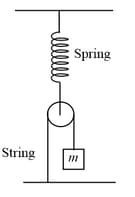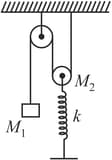Force and Energy Method in SHM
Force and Energy Method in SHM: Overview
This topic covers concepts, such as, Angular Frequency by Force Method & Angular Frequency by Energy Method etc.
Important Questions on Force and Energy Method in SHM
The ratio of kinetic energy at a mean position to potential energy at of a particle performing is
is the potential energy of an oscillating(SHM) particle and is the force acting on it at a given instant. Which of the following is correct?
(Given is displacement of the particle)
A cylinder of mass and radius lies on a plank of mass as shown. The surface between plank and ground is smooth, and between cylinder and plank is rough. Assuming no slipping between cylinder and plank, the time period of oscillations (when displaced from equilibrium) of the system is

Find the period of low amplitude vertical vibrations of the system shown The mass of the block is m. The pulley hangs from the ceiling on a spring with a force constant k. The block hangs from an ideal spring.

A particle of mass 5 x 10-5 kg is placed at the lowest point of a smooth parabola having the equation x2 = 40y (x, y in cm). If it is displaced slightly and it moves such that it is constrained to move along the parabola, the angular frequency of oscillation will be, approximately
A block of mass is constrained to move along with a moveable pulley of mass which is connected to a spring of force constant , as shown in the figure. If the mass of the fixed pulley is negligible and friction is absent everywhere, then the period of small oscillations of the system is

